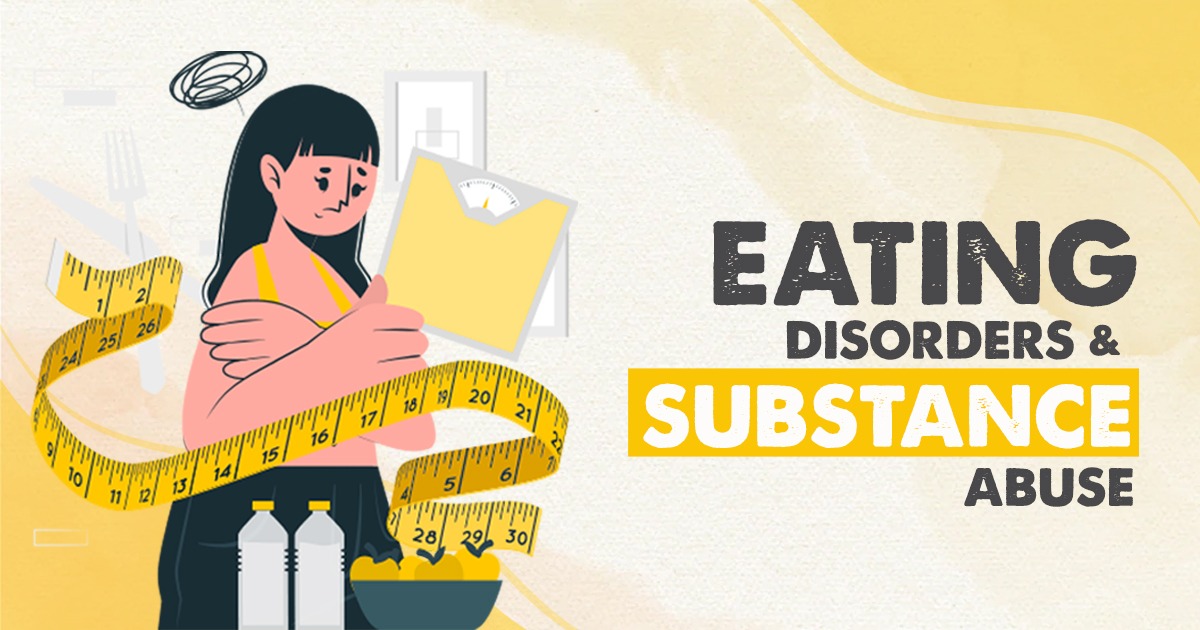Many people who suffer from eating disorders, such as anorexia, Bulimia, and binge eating disorder, also struggle with substance abuse. Substance use disorders and eating disorders may lead to other issues and even death when left untreated. These two conditions often occur concurrently, which may be harmful and difficult to cure.
What is Substance Use Disorder?
Many drug-related issues fall under the umbrella of “substance use disorders.” Substance-related disorders, such as those brought on by alcohol, marijuana, caffeine, and opioids, are all recognized in the DSM-5. Substance use disorders are separated from substance-induced disorders in the DSM-5. Addiction to drugs or alcohol is a mental health condition. Substance-induced disorders, on the other hand, include the intoxicating effects of drugs and the psychological and behavioral fallout of quitting drug use.
What’s an Eating Disorder?
Eating disorders are defined by dysfunctional relationships with food and body image that last for a significant period. Anorexia, Bulimia, and other forms of disordered eating are among the most dangerous medical conditions one may suffer from. Anorexia, Bulimia, and other eating disorders impact people of every age, race, and culture.
Do Drugs Cause Eating Disorders?
Some drugs affect your appetite and eating habits, such as cocaine and heroin, but they don’t normally specifically cause eating disorders. However, many people with eating disorders often struggle with substance abuse as well, as they both follow the same process of thinking. Additionally, someone with an eating disorder might get hooked on drugs like diet pills, or cocaine, for the weight loss side effects.
Substance abuse and eating disorders often occur together. For example, compared to women who do not have either condition, those with one are more than 4x more likely to have the other. One study found that 14% of women with drug abuse disorders also struggled with an eating disorder.
Half or more of those who suffer from an eating disorder also have a drug addiction problem, compared to around 10% of the general population. While just 3% of the general population suffers from an eating problem, 35% of those with a drug use disorder also have this condition.
When a person’s eating problem progresses to a more severe stage, they may start abusing additional drugs.
Anorexia Nervosa
Alcohol consumption is more prevalent in those with Anorexia Nervosa, particularly those who engage in binge eating and subsequent purging. Common methods of weight loss that include the use of stimulants include suppressing appetite and exercising more often.
Bulimia Nervosa
It is common practice to combine stimulants, which reduce hunger, with sedatives or marijuana, relieving the sleeplessness that commonly results from stimulants.
Binge-eating Disorder
Severe cases are often linked to alcohol use. Due to its appetite-stimulating effects, marijuana may also contribute to binge eating.
Assessment and Treatment of Eating Disorders and Substance Abuse
Given the significant comorbidity of both coexisting conditions, anybody receiving treatment for one should be checked for the other. Sadly, treatment experts skilled in detecting and treating one may not even be skilled in doing so for the other.
Historically, the concepts of and approaches to treating eating disorders and Substance Use Disorders have been considered separate entities.
Treatment for Substance Abuse Disorders
Substance use disorder treatment aims to help individuals develop more self-control and abstinence. Self-help programs, like Alcoholics Anonymous, are highly recommended for people with SUDs to reduce the likelihood of recurrence.
Eating Disorder Treatment
On the other hand, recovery from eating disorders is seen in a different light and needs intensive psychiatric treatment, nutritional guidance, and medical oversight. One of the main focuses of therapy is reestablishing healthy eating habits by decreasing control and eliminating compensatory behaviors like dieting and food restriction. Historically, self-help programs have not been seen as integral to treating or preventing relapse in those who suffer from an eating disorder.
Co-Treatment for Substance Use Disorders and Eating Disorders in Orange County, CA
Intensifying eating disorder symptoms are a typical side effect of drug addiction treatment. Similarly, people undergoing treatment for an eating disorder may find that they are using more substances as they work to eat more normally and eradicate their disordered eating and associated behaviors.
Importance of Expert Supervision
Patients struggling with an eating problem and a SUD may need inpatient or residential care. Both conditions raise the likelihood of experiencing health issues, making regular medical monitoring essential. Because a starving body may be unreliable in digesting drugs, experts warn against taking medicine to treat co-occurring substance use disorders and eating disorders. Similarly, health care providers for substance abuse often recommend lifestyle modifications like eating healthier and exercising more, even though doing so might increase the unpleasant side effects of eating disorders.
Best Approach to Cover this Coexisting Condition
Some Substance Use Disorders (SUDs) practitioners mistakenly believe that an eating problem is an addiction. However, the available data does not support the addiction model of eating disorders. Experts should counsel patients suffering from eating and drug use disorders to practice moderation in both areas. While they should tighten drug constraints, they should loosen restrictions on food intake.
It appears preferable, if possible, to choose a therapy method that considers both problems at once. Although there is a lack of research on combining therapies for both conditions, cognitive behavioral therapy (CBT) and behavioral therapy (DBT) have shown promise when administered to both conditions individually and are thus good candidates for integration. Patients suffering from eating disorders and drug abuse might benefit greatly from a specialized Cognitive Behavioral treatment known as integrated CBT.
To learn more about co-occurring treatment for eating disorders and substance use disorder in Orange County, CA, contact Covenant Hills Treatment at 844-268-8412.








